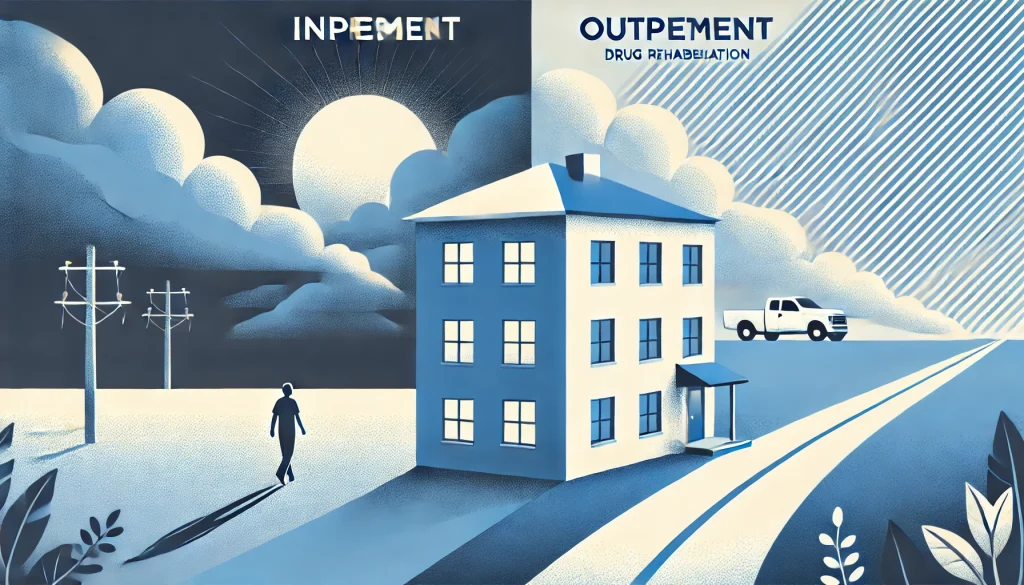What to Expect During Inpatient vs. Outpatient Drug Rehabilitation

Drug rehabilitation is a vital step in overcoming addiction and reclaiming control over one’s life. When individuals decide to seek help for substance abuse, they often face a choice between two main types of treatment: inpatient and outpatient rehabilitation. Both offer distinct advantages and challenges, depending on the individual’s needs, lifestyle, and the severity of their addiction. In this article, we will explore the key differences between inpatient and outpatient drug rehabilitation, what to expect from each, and how to determine which might be the right fit for you or a loved one.
Table of Contents
What is Drug Rehabilitation?
Before diving into the differences between inpatient and outpatient treatment, it’s essential to understand what drug rehabilitation (rehab) involves. Drug rehab is a structured treatment program aimed at helping individuals overcome their addiction to drugs, alcohol, or other harmful substances. Rehab can take many forms, but generally, it includes a combination of:
- Detoxification: The process of removing toxic substances from the body, typically accompanied by medical supervision to manage withdrawal symptoms.
- Therapy: Psychological counseling aimed at addressing the emotional and mental aspects of addiction. Therapy may include individual counseling, group therapy, cognitive behavioral therapy (CBT), and other therapeutic approaches.
- Support Services: Rehab also offers support services that help individuals build life skills, establish healthy routines, and create a foundation for long-term recovery.
The end goal of any rehab program is to help individuals achieve and maintain sobriety, address the underlying causes of addiction, and reintegrate into society as healthy, functioning members.
Now that we have a basic understanding of what drug rehab entails, let’s examine the differences between inpatient and outpatient programs and what you can expect from each.
What to Expect During Inpatient Drug Rehabilitation
Inpatient rehabilitation, also known as residential rehab, involves living at a treatment facility for the duration of the program. This type of rehab offers a highly structured environment that provides 24/7 medical and emotional support. Here’s what you can expect during inpatient rehab:
1. 24/7 Supervision and Care
One of the key benefits of inpatient rehab is the constant supervision and care available to patients. Trained medical staff and addiction specialists are on hand to monitor your physical and mental well-being, address any complications, and provide support as needed. This level of care can be especially critical for individuals with severe addictions or those who have experienced multiple relapses.
2. Medical Detoxification
In most cases, inpatient rehab begins with a period of detoxification. Detox can be physically and emotionally challenging, as the body adjusts to functioning without drugs or alcohol. Medical professionals will closely monitor your detox process to ensure your safety and comfort, often providing medications to ease withdrawal symptoms. Inpatient settings are ideal for detox because they offer immediate access to medical assistance should any complications arise.
3. Structured Schedule
Inpatient rehab offers a highly structured schedule, which is designed to eliminate distractions and help individuals focus entirely on their recovery. Daily activities may include:
- Group therapy sessions that foster peer support and accountability.
- Individual counseling where you work with a therapist to address personal challenges and triggers.
- Skill-building activities to promote healthy habits, coping mechanisms, and relapse prevention strategies.
- Physical fitness programs to support your body’s healing process.
- Recreational therapy, such as art, music, or outdoor activities, which can serve as healthy outlets for stress and anxiety.
The routine nature of inpatient rehab provides a solid foundation for individuals, helping them build discipline and structure that can carry into their post-rehab life.
4. Complete Focus on Recovery
Perhaps one of the biggest advantages of inpatient rehab is the ability to completely immerse yourself in recovery. Removed from daily stressors, triggers, and temptations, individuals can focus solely on getting better. This isolation from external influences often makes inpatient rehab particularly effective for people with severe addictions or co-occurring mental health disorders (dual diagnosis).
5. Safe and Supportive Environment
Inpatient facilities provide a safe, drug-free environment where individuals can focus on their recovery without the distractions or temptations of the outside world. The sense of community within inpatient programs also creates an atmosphere of support, where individuals can share their experiences, learn from each other, and build lasting relationships.
6. Longer Duration of Treatment
Inpatient rehab programs typically last anywhere from 30 to 90 days, depending on the individual’s needs. In some cases, programs can be extended beyond 90 days if necessary. The extended duration allows for comprehensive treatment and gives individuals the time they need to address deep-rooted issues and develop the skills necessary to maintain long-term sobriety.
What to Expect During Outpatient Drug Rehabilitation
Unlike inpatient rehab, outpatient rehabilitation allows individuals to receive treatment while continuing to live at home. This flexibility makes outpatient programs a good fit for people with mild to moderate addictions or those who have work, family, or other responsibilities they cannot neglect. Here’s what to expect during outpatient rehab:
1. Flexibility
Outpatient rehab programs offer a great deal of flexibility, allowing individuals to attend treatment sessions around their existing schedules. This flexibility makes outpatient rehab an attractive option for individuals who cannot afford to take time off from work, school, or family obligations.
Typically, patients attend therapy sessions for a few hours a day, several times a week. While the treatment schedule is less intensive than inpatient rehab, it still requires commitment and self-discipline to stay on track.
2. Less Supervision
One of the key differences between inpatient and outpatient rehab is the level of supervision. In outpatient programs, individuals live at home and are responsible for attending scheduled therapy sessions and meetings. This level of autonomy can be beneficial for individuals who have a strong support system at home or have already completed an inpatient program and are transitioning back into daily life.
However, for individuals who struggle with temptation or do not have a stable, supportive home environment, the lack of supervision can pose challenges to maintaining sobriety.
3. Therapy and Counseling
Just like inpatient rehab, outpatient programs include a combination of individual and group therapy sessions. The focus of therapy is to help individuals address the underlying causes of their addiction, develop healthy coping mechanisms, and prevent relapse.
Some common therapeutic approaches in outpatient rehab include:
- Cognitive Behavioral Therapy (CBT): Helps individuals recognize and change negative thought patterns and behaviors associated with substance abuse.
- Dialectical Behavioral Therapy (DBT): Focuses on mindfulness, emotional regulation, and distress tolerance.
- Family therapy: Involves family members in the recovery process to repair damaged relationships and create a supportive home environment.
- 12-Step Programs: These programs, such as Alcoholics Anonymous (AA) or Narcotics Anonymous (NA), offer peer support and encouragement throughout the recovery process.
4. Lower Cost
Outpatient rehab is generally more affordable than inpatient rehab, as individuals do not require 24/7 medical care or housing. This makes it an attractive option for people who need treatment but have limited financial resources. However, it’s important to note that the cost should not be the only determining factor when choosing between inpatient and outpatient care.
5. Continued Access to Support
While outpatient programs offer less supervision, they often provide ongoing access to support services, including therapy, case management, and peer support groups. These services help individuals maintain their sobriety and stay accountable during their recovery journey. Many outpatient programs also include aftercare planning, which helps individuals transition back into everyday life with a solid support system in place.
6. Balancing Treatment and Daily Life
A significant advantage of outpatient rehab is the ability to continue working, attending school, or caring for family members while receiving treatment. However, this also means that individuals must learn how to balance the demands of daily life with their recovery process. Without the structured environment of inpatient rehab, it can be more challenging to avoid triggers and maintain focus on sobriety.
How to Choose Between Inpatient and Outpatient Drug Rehabilitation
Choosing between inpatient and outpatient drug rehab depends on a variety of factors, including the severity of the addiction, personal circumstances, and individual preferences. Here are some questions to consider when making your decision:
- How severe is the addiction?
- Inpatient rehab is often recommended for individuals with severe addictions, multiple relapses, or co-occurring mental health disorders.
- Outpatient rehab may be appropriate for those with mild to moderate addiction who can maintain sobriety with minimal supervision.
- What kind of support system is available?
- Inpatient rehab offers a structured environment with constant supervision, making it ideal for individuals who do not have a strong support system at home.
- Outpatient rehab allows individuals to stay at home, so it’s important to have a supportive network of friends and family to assist in the recovery process.
- What are the personal and financial circumstances?
- Inpatient rehab requires a significant time commitment, often requiring individuals to take time off work or school. It can also be more expensive than outpatient programs due to the cost of housing and 24/7 care.
- Outpatient rehab is more flexible and affordable, making it a better option for individuals who need to balance treatment with other responsibilities.
- What is your recovery goal?
- If you need a highly structured environment to focus solely on recovery and build a solid foundation for long-term sobriety, inpatient rehab may be the best option.
- If you’re looking for a more flexible approach to treatment that allows you to continue with your daily routine, outpatient rehab may be a better fit.
Conclusion: Inpatient vs. Outpatient Drug Rehabilitation
Both inpatient and outpatient drug rehabilitation offer valuable paths to recovery, and the right choice depends on individual needs and circumstances. Inpatient rehab provides a structured, supportive environment for those who need intensive care, while outpatient rehab offers flexibility for individuals who can maintain sobriety with less supervision.
The decision between inpatient and outpatient rehab is a personal one, and it’s important to seek professional guidance when choosing the right program. Whatever path you choose, remember that recovery is a journey, and with the right support, sobriety is within reach.


